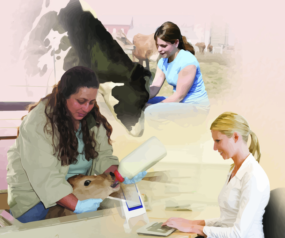Recent changes to national and international milk quality standards have dairy producers everywhere working to continue to meet or surpass those standards.
Supplying dairy farmers with tools to help maintain and improve milk quality is key to sustainability, including the southeastern U.S. Standard practices, such as pre- and post-dipping, glove use, stripping or removing the first few streams of milk from the quarter, and dry cow therapy are known to impact milk quality, but are not universally implemented.
Studying the attitudes of farmers regarding these practices can provide valuable insight as to why a producer may or may not adopt a practice.
The Southeast Quality Milk Initiative (SQMI), a collaboration among the University of Tennessee, University of Kentucky, Virginia Polytechnic University, Mississippi State University, University of Georgia and University of Florida, surveyed the attitudes and perceptions dairy farmers hold about effectiveness and practicality of a variety of practices related to milk quality in the Southeast to address this gap in adoption.
To complete this evaluation, 1,966 dairy farmers in Georgia, Mississippi, Kentucky, North Carolina, South Carolina, Tennessee and Virginia were mailed a seven-page questionnaire addressing their use of and thoughts on the effectiveness and practicality of:
- Having and implementing a mastitis management plan
- Training employees in milking procedures to reduce bulk tank somatic cell count (SCC)
- Evaluating employees based on performance with mastitis and bulk SCC control measures
- Milking mastitis and treated cows in separate groups
- Using hygienic supplies (gloves and fresh towels for each cow) for milking
- Disinfecting teats of all cows before milking (pre-dipping)
- Disinfecting teats of all cows after milking (post-dipping)
From the 30 percent of responding farms, the perceived effectiveness and practicality for three of the above factors were associated with self-reported bulk tank SCC:
- Disinfecting teat ends of all cows before milking
- Training employees in milking procedures to reduce bulk tank SCC
- Having and implementing a mastitis management plan
Pre-milking teat disinfection has long been considered an important part of a mastitis control program as it helps reduce the bacterial load on the teat end prior to milking and was used by 95 percent of our respondents.
However, the variation in the perception of how effective and practical this was and its relationship to bulk tank SCC was surprising with certain attitudes separated by about 100,000 cells/ml.
Those who viewed pre-milking disinfection as very practical and effective (about 39 percent of respondents) had significantly lower bulk tank SCC than those who viewed it as moderately practical and effective or did not feel strongly one way or the other.
Although we did not assess why producers felt this way, it most likely reflects past experiences where they felt pre-dipping was not effective in reducing bulk tank SCC. However, effectiveness of this practice can be influenced by the type of product selected, the level of organic material on the teat end and coverage of teat dip, among other factors.
Recent research has also implicated the interaction of employers and employees, or lack thereof, in the successful management of bulk tank SCC.
Our research supports this finding, as producers who felt training of milking personnel was very effective and practical (about 19 percent of respondents) had significantly lower bulk tank SCC than those who were neutral or found this process only somewhat effective and practical.
A gain of about 30,000 to 45,000 cells/ml was observed for each improvement in attitude. Several factors can contribute to these variations in perception, including language skills in operations that have employees with different primary languages, trainer knowledge of why certain practices are important, the ability or willingness to transfer this knowledge to employees, interest of employees in learning these skills, available time for training and other issues.
Producers who viewed having and implementing a mastitis management plan as very practical and effective (about 10 percent of respondents) had a bulk tank SCC about 45,000 to 80,000 cells/ml lower than those who were either neutral or viewed a plan as somewhat effective and practical.
The variation in perception and attitude may reflect ease of access to herd veterinarians and other human resources, access to material resources, knowledge of practices by producers and personnel, in addition to other factors.
Another important factor for producers to consider is adopting a plan that fits into their operation and accurately addresses the problem areas on the farm. Producers can work with their herd veterinarians, local extension agents or other advisers to develop and implement a good mastitis management plan.
In conclusion, attitude is key. Dairy producers who view certain mastitis management strategies as highly effective and practical have herds with lower bulk tank SCC than farmers who find them to be ineffective or impractical. As a consultant, this means getting at the reason for why producers have formed their attitude in order to help them make changes on their individual operation.
As a producer, this means having a positive attitude, believing these practices are worth the time and effort required for effective implementation and developing a plan that fits your operation to help make progress toward reaching bulk tank SCC goals. PD
This material is based upon work that is supported by the National Institute of Food and Agriculture, U.S. Department of Agriculture, under award number 2013-68004-20424.
Any opinions, findings, conclusions or recommendations expressed in this publication are those of the author(s) and do not necessarily reflect the view of the U.S. Department of Agriculture. Please visit Southeast Quality Milk Initiative for more information about SQMI.
Gina Pighetti is an associate professor in animal science at the University of Tennessee.
PHOTO: Staff photo.









